Attendance Registration
Attendance Registration is a tool for the educational sector that makes it easy to register attendance. Through a simple and intuitive interface, the teacher can register who is present, who is late, and who is absent. Registering attendance can be done in a matter of seconds, simply by clicking the button with the student’s name and picture. The interface uses colour codes, which makes it easy to see what the individual students are registered as. You decide which attendance options you want to use - i.e. options for being late, for legal absence, and illegal absence - as well as which colours are used for the different options. When attendance is registered, UMS automatically writes back to the administrative system - if supported. The interface also supports the possibility to see if the student has sent a text message to the school or if the staff has written notes regarding the student’s attendance.
There are references to other UMS modules, e.g. SMS, in this guide. In case the mentioned modules are not present in your environment, you can ignore these settings.
In order to edit templates, it is also required to have a basic knowledge about the UMS configurator.
1. Prerequisites
1.1. Supported administrative systems
- Easy-C
- Lectio
- SIS
- Other systems where it is possible to retrieve a timetable for students and teachers
1.2. Module requirements
1.3. Testing after setup
To get started with testing after setup, you must log in as a teacher. See if you have access to attendance registration on the front page of UMS portal.
Click on attendance registration and check that you can search for timetables for students, teachers, and classes.
Check that you can register individual students as absent.
1.4. What is necessary to get started
To get started, it is necessary to have a running UMS installation.
2. Installation
Install UMS and UMS Academic Web
3. Technical settings
3.1. Settings for UMS Attendance Basic
All settings for UMS Attendance Basic is set in the configurator. In the main menu under 'Settings/Services', it is necessary to set the 'Absence service' to run on a server. The service is responsible for sending text messages to students that are registered as absent. Please make sure the service has started and is running. See example of the set up below.
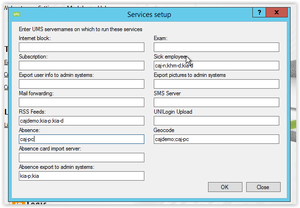
3.2. Global settings
Global settings are settings that are valid for the entire school. For settings that can be altered per education, class, or similar, see 'Individual settings'.
The Global settings are:
- Attendance colours
- Design text messages sent to the students
- Attendance types (late, approved, not approved)
- Granting access to teachers/employees and edit access to registration forward-looking
- Possibility of registering attendance forward-looking
3.2.1. Attendance colours
Settings are found under 'Modules\Absence\colors' in the main menu. Simply select the colours you want to use for each type of attendance. See example below.
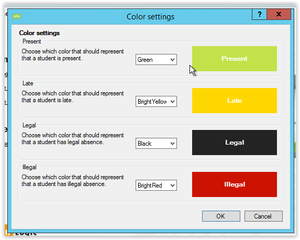
3.2.2. Designing text messages sent to the students
It is possible to preset text messages that will be sent to students if they are registered as absent. The settings are found under 'Modules\Absence\SMS' in the main menu. The text messages can be set for each type of attendance both in Danish and English. It is also possible to create multiple text messages for each type of attendance. If you create multiple messages, the system will randomise these messages. Meaning, the system will send different messages to a student each time attendance is registered. See example below.
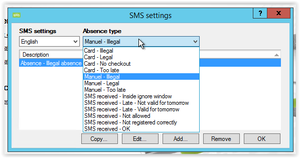
When you edit a message, there are several variables that can be used to ensuaking the messages more personalised. See example below.
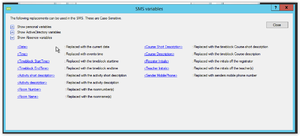
3.2.3. Set types of attendance
3.2.4. Granting access to teachers/employees and edit access to registration forward-looking
Granting access to functions in the registration interface is done under 'Setup web access/Absence'. Attendance basic allows 'register access' and 'Future registration access'. Enter a group (nested groups are allowed) with the teacher/employees that are allowed to use the specific function. See example below.
The checkboxes have the following meaning:
- 'Count too late on statistics' – Not used for Attendance basic
- 'Show empty days' – Should the day ruler show or omit days with no planned timetable?
- 'Show weekends' – Should the day ruler show or omit weekends?
- 'Show legal' – Is legal attendance used on the school/is it shown in the protocol?
- 'Show illegal' – Is illegal attendance used on the school/is it shown in the protocol?
- 'Show too late' – Is too late attendance used on the school/is it shown in the protocol?
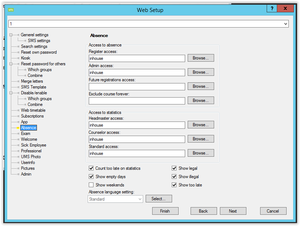
To edit letters and text used in the attendance module, choose the button 'Select' (see the window above).
Double-click on the row containing the settings you want to edit. See below:
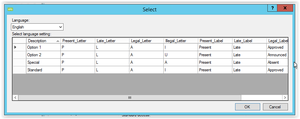
3.3. Individual settings
Individual settings are can be altered per education, class, or similar. For settings valid for the entire school, see 'Global settings'.
Days back the teachers are allowed to change/edit attendance
Send SMS when the student is absent
Settings for register sick through SMS
Number of minutes a late show should count
If an individual setting is needed, a template has to be configured covering this group of students beforehand.
All individual settings are set under each template, Absence\Settings:

Keyword “Sick” means that the student, needs to send a message in this form:
“sick” or “sick %reason or message to the teacher%”. All types of cases are allowed.
The setting for ignore start/end times means:
If the message is received before 10:00.
The system will check the students schedule for blocks on the day, and mark the blocks with “Legal absence” and send the student a reply.
If the message is received between 10:00 and 15:00
Send the student a reply, saying that it is disallowed to register sick at this time.
If the message is received after 15:00
The system will check for blocks tomorrow, and mark those with “Legal absence” and send a reply.
“Days back” is the number of days it is allowed edit attendance back in time. NB: This setting cannot exceed the number of days back in the global timetable block data job!
“Too late” is the number of minutes a late show is penalized.